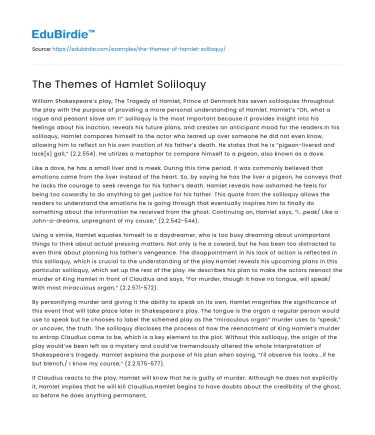William Shakespeare’s play, The Tragedy of Hamlet, Prince of Denmark has seven soliloquies throughout the play with the purpose of providing a more personal understanding of Hamlet. Hamlet’s “Oh, what a rogue and peasant slave am I!” soliloquy is the most important because it provides insight into his feelings about his inaction, reveals his future plans, and creates an anticipant mood for the readers.In his soliloquy, Hamlet compares himself to the actor who teared up over someone he did not even know, allowing him to reflect on his own inaction of his father’s death. He states that he is “pigeon-livered and lack[s] gall,” (2.2.554). He utilizes a metaphor to compare himself to a pigeon, also known as a dove.
Like a dove, he has a small liver and is meek. During this time period, it was commonly believed that emotions came from the liver instead of the heart. So, by saying he has the liver a pigeon, he conveys that he lacks the courage to seek revenge for his father’s death. Hamlet reveals how ashamed he feels for being too cowardly to do anything to get justice for his father. This quote from the soliloquy allows the readers to understand the emotions he is going through that eventually inspires him to finally do something about the information he received from the ghost. Continuing on, Hamlet says, “I...peak/ Like a John-a-dreams, unpregnant of my cause,” (2.2.542-544).
Save your time!
We can take care of your essay
- Proper editing and formatting
- Free revision, title page, and bibliography
- Flexible prices and money-back guarantee
Using a simile, Hamlet equates himself to a daydreamer, who is too busy dreaming about unimportant things to think about actual pressing matters. Not only is he a coward, but he has been too distracted to even think about planning his father’s vengeance. The disappointment in his lack of action is reflected in this soliloquy, which is crucial to the understanding of the play.Hamlet reveals his upcoming plans in this particular soliloquy, which set up the rest of the play. He describes his plan to make the actors reenact the murder of King Hamlet in front of Claudius and says, “For murder, though it have no tongue, will speak/ With most miraculous organ,” (2.2.571-572).
By personifying murder and giving it the ability to speak on its own, Hamlet magnifies the significance of this event that will take place later in Shakespeare’s play. The tongue is the organ a regular person would use to speak but he chooses to label the schemed play as the “miraculous organ” murder uses to “speak,” or uncover, the truth. The soliloquy discloses the process of how the reenactment of King Hamlet’s murder to entrap Claudius came to be, which is a key element to the plot. Without this soliloquy, the origin of the play would’ve been left as a mystery and could’ve tremendously altered the whole interpretation of Shakespeare’s tragedy. Hamlet explains the purpose of his plan when saying, “I'll observe his looks...if he but blench,/ I know my course,” (2.2.575-577).
If Claudius reacts to the play, Hamlet will know that he is guilty of murder. Although he does not explicitly it, Hamlet implies that he will kill Claudius,Hamlet begins to have doubts about the credibility of the ghost, so before he does anything permanent, he wants to have better evidence. He states, “I'll have grounds/ More relative than this: the play's the thing/ Wherein I'll catch the conscience of the king,” (2.2.582-584). The last bit of the soliloquy makes the readers anticipate to find out whether or not Claudius actually committed the murder and if Hamlet will step up to the plate to kill him if the ghost was right.
Hamlet, so far, has been known to be cowardly and indecisive, so his words can be perceived in two different ways. It could be him developing into a braver person or it can be seen as him still being a coward and trying to stall from having to kill Claudius. The atmosphere intensifies the curiosity and expectations of what’s to come. Because of this, the soliloquy keeps the reader guessing, and therefore, engaged.Hamlet’s third soliloquy contains a better understanding of his state of mind, a description of what lies ahead in the play, and an expectant atmosphere of what’s to come, making it the most crucial soliloquy of the entire play.






 Stuck on your essay?
Stuck on your essay?

